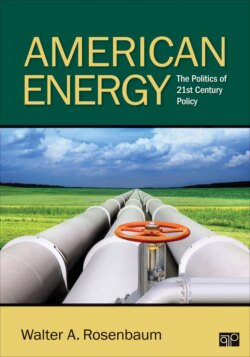Читать книгу American Energy - Walter A. Rosenbaum - Страница 30
На сайте Литреса книга снята с продажи.
National Security
ОглавлениеIt is a measure of the impact of domestic energy management upon national security that discussions of US energy policy are now commonly framed as “energy security.” In the years since the energy shocks of the 1970s, national security has become increasingly vulnerable in all important senses—military, diplomatic, economic, political—to alterations in global energy markets. Slowly, very reluctantly, most American policymakers have accepted the reality that this vulnerability is likely to continue for decades, perhaps permanently.56 Since 2010, however, the US boom in fossil fuel fracking, discussed in chapters 3 and 7, has prompted many experts to suggest that a new era of energy independence with its implied improvement in national security may be imminent. Others aren’t so sure. In any case, any issue concerning US energy development will sooner or later involve a discussion of the national security implications.
In an effort to buffer the future impact of sudden imported petroleum shortfalls, the United States in 1975 created the Strategic Petroleum Reserve (SPR) located in salt domes along the Gulf of Mexico. The SPR, the world’s largest emergency petroleum reserve, containing as much as 727 million barrels of crude oil, could provide, at best, several months of crude oil to meet a heavy domestic demand. Despite these and other measures to diminish the security risks posed to the United States by sudden adverse international energy events, the United States remains intricately embedded in the global energy system. Thus, exposed to the impact of global energy disturbances, practically all significant domestic energy policies, and their modification, compel domestic national policymakers to conceive the issues in the framework of national security.
